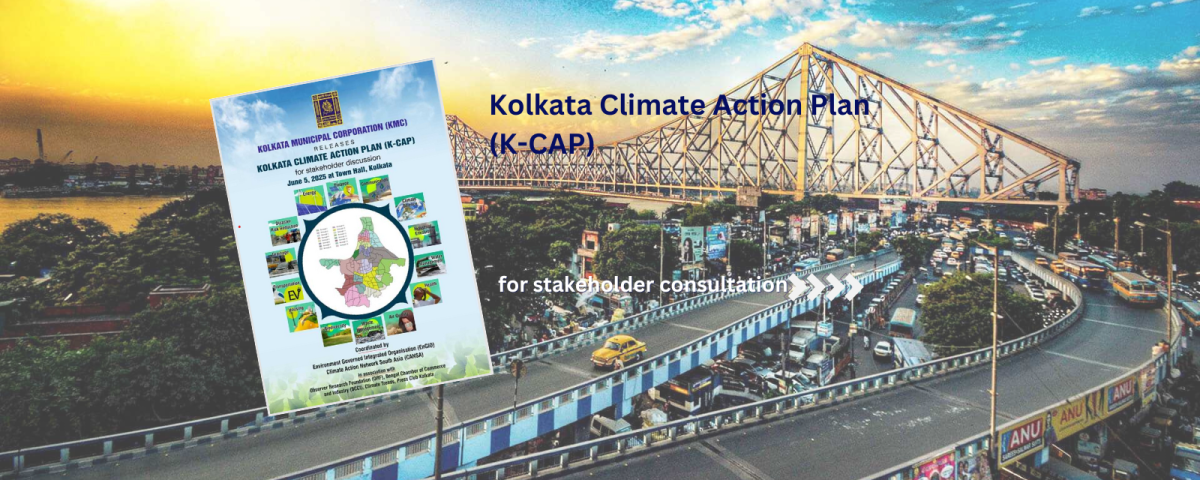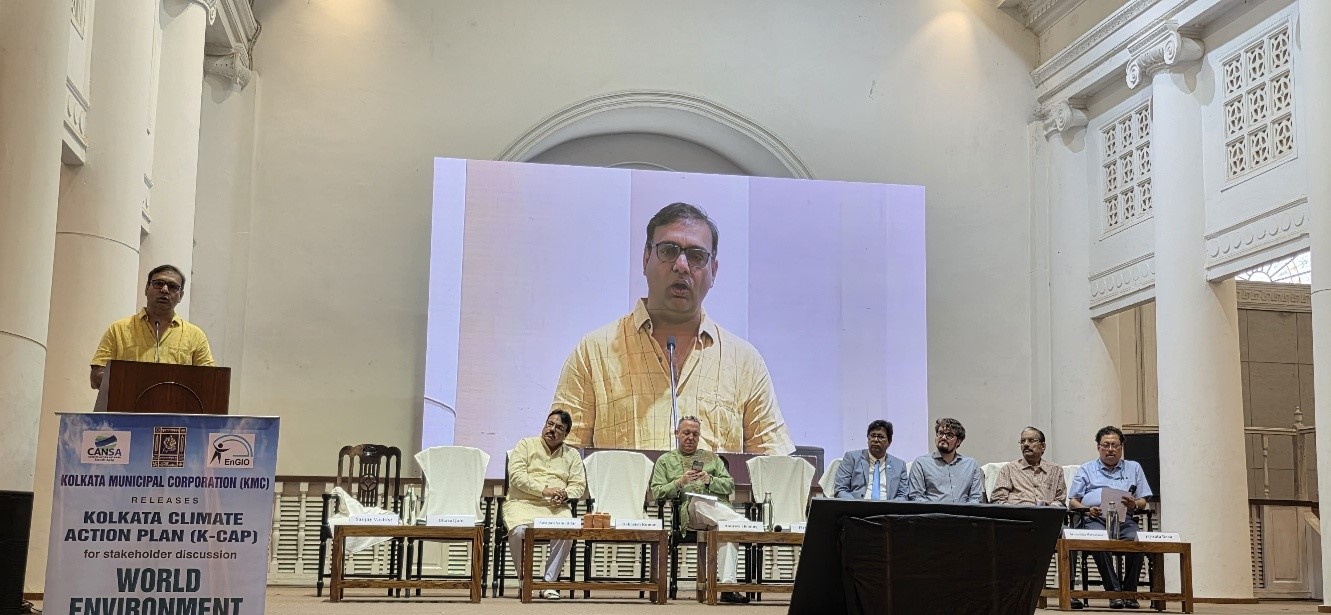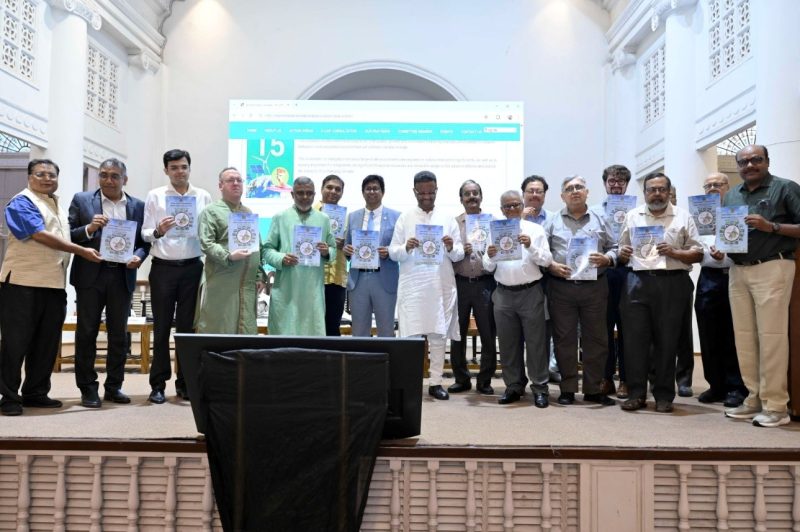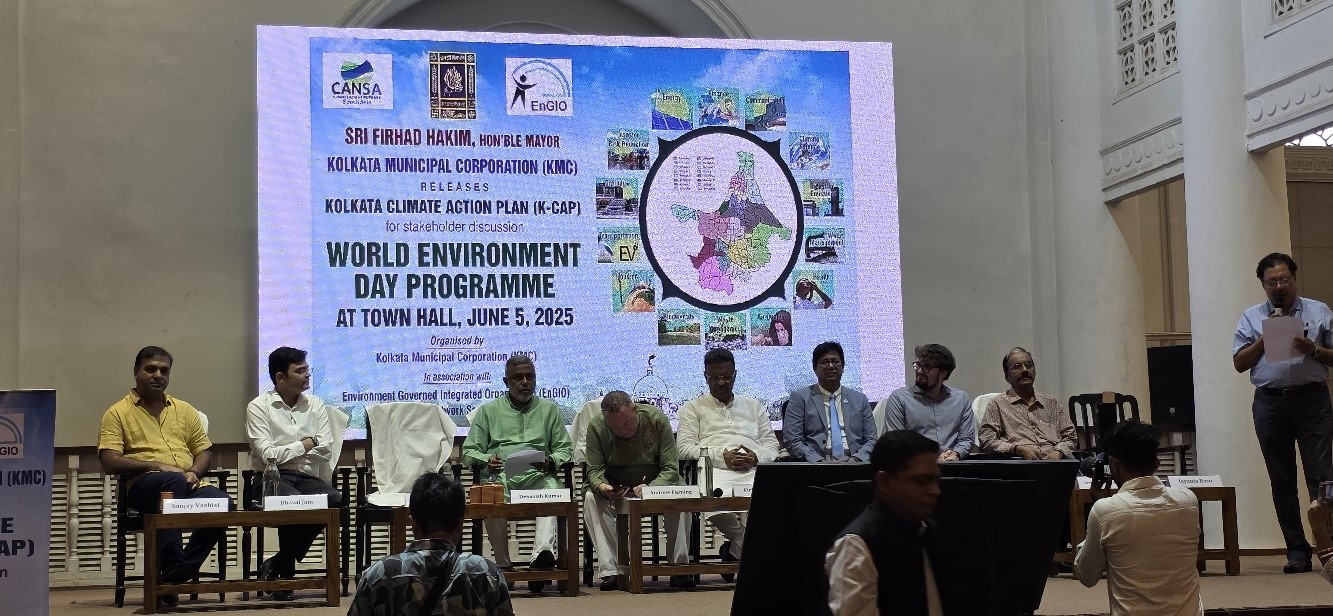
Kolkata Climate Action Plan (KCAP) Released for Stakeholder Consultation
Townhall, Kolkata | June 5, 2025
Coordinated by:
Environment Governed Integrated Organisation (EnGIO) & Climate Action Network South Asia (CANSA)
In association with: ORF | Bengal Chamber of Commerce & Industry | Climate Trends | Press Club Kolkata



Introduction
The Kolkata Municipal Corporation (KMC) released the Kolkata Climate Action Plan (KCAP) for stakeholder consultation on World Environment Day, June 5, 2025. This milestone marks the culmination of over 18 months of research, coordination, and collaboration led by the KMC in partnership with expert institutions and civil society organisations.
The KCAP has been developed as a comprehensive response to the city’s escalating climate risks and is rooted in scientific evidence, official data, and extensive consultations. This version is open for stakeholder input, and a final plan will be issued after further deliberation.
The plan is coordinated by EnGIO and CANSA, with the support of key partners including ORF, BCCI, Climate Trends, and Press Club Kolkata. An expert committee, established by KMC in 2023, has played a central role in guiding the plan’s direction and recommendations.
Kolkata, often called the cultural capital of India and a rising economic hub in eastern India, is today among the world’s most climate-vulnerable megacities. Spread across the lower Ganges Delta and bordered by the ecologically sensitive Sundarbans, the city faces rising threats from sea level rise, extreme heat, erratic rainfall, cyclones, and flooding.
With over 4.5 million residents—one-third living in low-income or slum settlements—and millions more commuting daily from peripheral regions, Kolkata is one of the most densely populated cities globally. Once rich in wetlands and green spaces, it now grapples with high concretization, loss of tree cover, and growing air pollution—all of which compound climate risks.
Scientific assessments, including the IPCC AR6, reveal that Kolkata has already experienced a 2.7°C rise in average temperature since the pre-industrial period. Projections show this could climb to 4.5°C by 2080 under a high-emission scenario. The city ranks among the top 20 globally in potential flood losses by 2050, with additional risks of heatwaves, storm surges, and subsidence.
Despite commendable efforts—air pollution control, green mobility initiatives, improved disaster infrastructure, and recognition through the C40 Cities Bloomberg Philanthropies Award—much more is required to build resilience and ensure a sustainable urban future.
The Kolkata Climate Action Plan (KCAP), led by the Kolkata Municipal Corporation with support from expert institutions and civil society, is a crucial step toward this goal. It provides a comprehensive, inclusive, and science-based roadmap for safeguarding the city and its people—especially the most vulnerable—from the escalating climate crisis.
Key Sectors Addressed in KCAP
- Energy transition & fossil fuel phase-down
- Disaster risk reduction
- Drainage & urban flooding
- Transportation
- Housing
- Urban greenery & biodiversity
- Solid waste management
- Air quality
- Public health
- Water management (surface & groundwater)
- Industry
- Climate science
- Finance & resource mobilisation
Priority Actions Identified
- Development of climate-resilient industrial policy
- Conservation of East Kolkata Wetlands (EKW)
- Implementation of a city-wide Heat Action Plan
- Climate-smart slum interventions
- Prevention of biomass burning
- Expansion of solar energy
- Accelerated phase-down of fossil fuels
“Let us understand collectively—this is not just a Kolkata Climate Action Plan; it is actually a Survival Action Plan for Kolkata. The survival of our future generations depends on how successfully we act today. We are already working on several sectors, but this plan is likely to guide us more meaningfully to embed sustainability.”
— Sri Firhad Hakim, Mayor, KMC & Chairman, KCAP Committee
“I congratulate the Mayor of Kolkata and his administration for their initiative in putting together the Kolkata Climate Action Plan, which is an urgent need of the hour. Kolkata is among the most progressive cities in South Asia in terms of understanding the need for a climate action plan that incorporates justice and equity, and the needs of its countless poor and vulnerable citizens.”
— Sanjay Vashist, Director, Climate Action Network South Asia (CANSA), Joint Convener of KCAP Expert Committee
“The IPCC has flagged dramatic temperature increases in Kolkata this century, such as a 4.5 °C rise by century‑end, along with a surge in cyclones and rising sea levels. This underscores the scale of the challenge and why a robust plan like KCAP is urgently needed. I am proud that Kolkata is taking proactive, science-based steps with KCAP—crafted through collaboration, commitment, and care—to safeguard the future of our city and its people. What is extremely important, is the fact that the plan is quite inclusive and focused on urban poor; the most vulnerable part of the population.”
— Dr Jayanta Basu, Director, Environment Governed Integrated Organization (EnGIO), Joint Convener of KCAP Expert Committee
“Unicef is committed to support KCAP as climate change , along with pollution and biodiversity, forms the fulcrum of the global environmental crisis including in Kolkata particularly affecting the children. We need a child friendly climate action plan , and is committed to support such an endeavour.”
— Monjur Hossain, Head of Unicef, Kolkata
“I see KCAP just not as a plan but a set of deadlines, obligations and guidelines those we need to pursue at a time bound manner.”
— Dhaval Jain, Commissioner KMC
“I have been part of several global climate summits in the last few years and understood how big the agenda is; and how important role we, the politicians, play in the context. I commit full support on behalf of me and KMC in implementing KCAP.”
— Debasish Kumar, MLA, Member of Mayor Council KMC and Vice Chair, KCAP
To review the copy of the Report of Kolkata Climate Action Plan (K-CAP) Download Report













